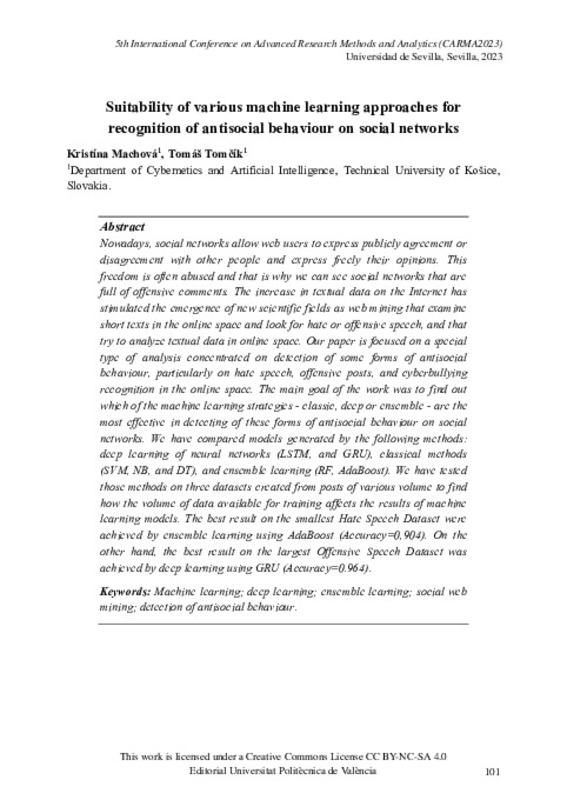JavaScript is disabled for your browser. Some features of this site may not work without it.
Buscar en RiuNet
Listar
Mi cuenta
Estadísticas
Ayuda RiuNet
Admin. UPV
Suitability of various machine learning approaches for recognition of antisocial behaviour on social networks
Mostrar el registro sencillo del ítem
Ficheros en el ítem
| dc.contributor.author | Machová, Kristína
|
es_ES |
| dc.contributor.author | Tomčík, Tomáš
|
es_ES |
| dc.date.accessioned | 2024-01-11T11:47:30Z | |
| dc.date.available | 2024-01-11T11:47:30Z | |
| dc.date.issued | 2023-09-22 | |
| dc.identifier.isbn | 9788413960869 | |
| dc.identifier.uri | http://hdl.handle.net/10251/201782 | |
| dc.description.abstract | [EN] Nowadays, social networks allow web users to express publicly agreement or disagreement with other people and express freely their opinions. This freedom is often abused and that is why we can see social networks that are full of offensive comments. The increase in textual data on the Internet has stimulated the emergence of new scientific fields as web mining that examine short texts in the online space and look for hate or offensive speech, and that try to analyze textual data in online space. Our paper is focused on a special type of analysis concentrated on detection of some forms of antisocial behaviour, particularly on hate speech, offensive posts, and cyberbullying recognition in the online space. The main goal of the work was to find out which of the machine learning strategies - classic, deep or ensemble - are the most effective in detecting of these forms of antisocial behaviour on social networks. We have compared models generated by the following methods: deep learning of neural networks (LSTM, and GRU), classical methods (SVM, NB, and DT), and ensemble learning (RF, AdaBoost). We have tested those methods on three datasets created from posts of various volume to find how the volume of data available for training affects the results of machine learning models. The best result on the smallest Hate Speech Dataset were achieved by ensemble learning using AdaBoost (Accuracy=0,904). On the other hand, the best result on the largest Offensive Speech Dataset was achieved by deep learning using GRU (Accuracy=0.964). | es_ES |
| dc.description.sponsorship | Scientific Grant Agency of the Ministry of Education, Science, Research and Sport of the Slovak Republic, and the Slovak Academy of Sciences under grant no. 1/0685/21 and the Slovak Research and Development Agency under grant no. APVV–16–0213 | es_ES |
| dc.language | Inglés | es_ES |
| dc.publisher | Editorial Universitat Politècnica de València | es_ES |
| dc.relation.ispartof | 5th International Conference on Advanced Research Methods and Analytics (CARMA 2023) | |
| dc.rights | Reconocimiento - No comercial - Compartir igual (by-nc-sa) | es_ES |
| dc.subject | Machine learning | es_ES |
| dc.subject | Deep learning | es_ES |
| dc.subject | Ensemble learning | es_ES |
| dc.subject | Social web mining | es_ES |
| dc.subject | Detection of antisocial behaviour | es_ES |
| dc.title | Suitability of various machine learning approaches for recognition of antisocial behaviour on social networks | es_ES |
| dc.type | Capítulo de libro | es_ES |
| dc.type | Comunicación en congreso | es_ES |
| dc.relation.projectID | info:eu-repo/grantAgreement/SRDA//APVV–16–0213 | es_ES |
| dc.relation.projectID | info:eu-repo/grantAgreement/VEGA-SAV//1%2F0685%2F21 | es_ES |
| dc.rights.accessRights | Abierto | es_ES |
| dc.description.bibliographicCitation | Machová, K.; Tomčík, T. (2023). Suitability of various machine learning approaches for recognition of antisocial behaviour on social networks. Editorial Universitat Politècnica de València. 101-102. http://hdl.handle.net/10251/201782 | es_ES |
| dc.description.accrualMethod | OCS | es_ES |
| dc.relation.conferencename | CARMA 2023 - 5th International Conference on Advanced Research Methods and Analytics | es_ES |
| dc.relation.conferencedate | Junio 28-30, 2023 | es_ES |
| dc.relation.conferenceplace | Sevilla, España | es_ES |
| dc.relation.publisherversion | http://ocs.editorial.upv.es/index.php/CARMA/CARMA2023/paper/view/16399 | es_ES |
| dc.description.upvformatpinicio | 101 | es_ES |
| dc.description.upvformatpfin | 102 | es_ES |
| dc.type.version | info:eu-repo/semantics/publishedVersion | es_ES |
| dc.relation.pasarela | OCS\16399 | es_ES |
| dc.contributor.funder | Scientific Grant Agency, Eslovaquia | es_ES |
| dc.contributor.funder | Slovak Academy of Sciences | es_ES |
| dc.contributor.funder | Slovak Research and Development Agency | es_ES |






